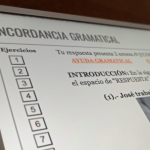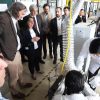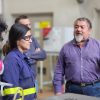By Verónica Gormaz / vgormaz@udec.cl
/ Photographies: Courtesy of FI
Autonomous vehicles, smart traffic lights, highly technological services are perhaps the first thing we imagine when we talk about Smart cities. However, for the civil engineer and professor at the Faculty of Engineering at the UdeC, Juan Antonio Carrasco, there is a view where the key is not focused only on technological innovation, but also on how we incorporate technology into design, management and citizen planning.
Carrasco, who is a specialist in mobility and a researcher at CEDEUS and ISCI, comments that there is a tendency to believe that smart cities are a response to technological changes, such as sensorization, which allows many aspects of life in the city to be measured like never before. It is also related to more specific technologies that supposedly involve behavior change, such as electric cars. However, these technologies by themselves do not imply an improvement in the quality of life, if an analysis of their impacts and citizen participation planning are not incorporated.
“It is globally considered that the technology will be enough to talk about smart cities. In reality that is not the case, and here comes the complicated work: to use the collected data in order to make an analysis in the planning, design and maintenance of infrastructures,” he explains.
“TAKING POSSESSION OF TECHNOLOGY”
In the particular context of the UdeC Faculty of Engineering, Carrasco explains, they have been working, among other topics, on infrastructure in cities, with particular emphasis on the role of technologies in their life cycle, associated with planning, design, construction and maintenance. An example of this is the upcoming agreement to be signed, between the Faculty and the Ministry of Public Works, in order to incorporate sensors.
The challenge that almost every project faces is to make sense of the growing information available to us, which will allow us to make better decisions in the development of our cities, so that they are really smarter and the quality of life of their habitants is improved.
For Juan Antonio Carrasco, we are at a stage where we need to appropriate technology, by developing it and adapting it to our reality and challenges.
Another aspect highlighted by the researcher from the UdeC Faculty of Engineering is that smart cities contain aspects that are not necessarily technological and that, they rather have to do with a kind of integration between the different actors, such as citizens, public and private organizations, the university, and politicians and authorities. “The key is how to take advantage of the possibilities technology offers, collecting data which allows us to better understand the impacts of infrastructure and which also facilitates making the best possible decisions,” he concluded.
For more information, please contact:
juancarrasco@udec.cl
Last modified: 2 de junio de 2023






